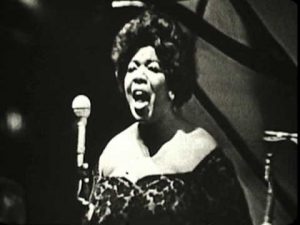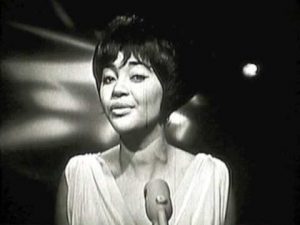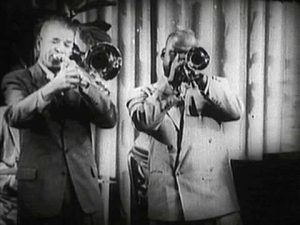Charlie Parker was clearly rattling some musical cages in 1945. Some alto men listened to him, appreciated his work, even recorded with him, but were unaffected by his new approach to the music. Benny Carter and Johnny Hodges come to mind. Others, like Rudy Williams, were thrown for a loop, trying hard, yet struggling, to integrate his ideas, phrasing and advanced harmonies into their own playing.
It seems that each major jazz center had alto men who picked up on Bird’s message in the mid 1940s. In Chicago, one such musician was John “Flap” Dungee. In 1945, Dungee joined Dallas Bartley and his six piece combo, and his presence in this particular group, at this particular time, allows us to see and hear one of the earliest examples of bebop on film.
Missouri-born Dallas Bartley is certainly not a household name in the jazz world. Bartley moved to Chicago in the late 1930s, string bass in hand, and as a journeyman musician spent a great deal of time with Louis Jordan. In between stints with Jordan’s Tympany Five, he worked with Roy Milton, and can also be heard on recordings with such jazz/rhythm-and-blue artists as Big Joe Turner, Tom Archia and Pete Brown. Bartley’s sole recording date, from September 1944, yielded one 78rpm recording! Club dates in Chicago kept Bartley busy in the 1940s and 1950s, and he quietly left the music in the 1960s.
That might serve as a brief Internet history of Mr. Bartley, save for one delicious twist of fate: In 1945 he brought a combo from Chicago to New York City. The six-piece group landed a week-long gig at the Apollo Theater in late April, and it is likely that someone from the SOUNDIES organization (or perhaps a representative from Sun Tan Studio, an important Harlem talent agency) noted the group, and realized that here was a jazz combo that could make the grade in a series of SOUNDIES …. and do so without breaking the budget. (The combo was paid a total of $336 for their work in the five SOUNDIES series, and with Bartley probably taking a “leader’s share,” the sidemen probably did not make much.)
But how fortunate we are that the films were made during a brief production session in May 1945. Soon after, the combo returned to Chicago, where each musician continued the daily grind of trying to make a living in jazz music. There were club dates, occasional recordings, but (save for Josh Jackson), no more films.
Our sample of the band’s SOUNDIES output is All Ruzzitt Buzzitt, a rather inconsequential jump tune that Bartley had recorded for Cosmo in 1945. While Bartley sings on the record, the vocal here is taken by trumpet player Bill Martin. Martin had spent the early part of his career in Kansas City, arriving in Chicago during World War II. Chicago drummer Charles Walton noted that Martin was not particularly known for his chops on the trumpet: “Martin was really something of a con man, he had the gift of gab.” The tenor sax on the band, Josh Jackson, spent six years with Louis Jordan, from 1945 to 1951. Pianist James Craig appears to be out of his league, and his comping on this piece is, to be very polite, inappropriate and not very swinging; Craig later left music and joined the police force in Chicago. On drums we have a very swinging Hillard Brown, who subbed for Sonny Greer in the Duke Ellington orchestra the year before this film was made.
And then the is John “Flap” Dungee, a talented alto sax man from whom we hear very little on record: two dates with Gene Ammons, one with Tom Archia, one with Big Joe Turner. But there is this film, in which Bird is clearly heard in Dungee’s playing. The sound is Bird’s, the conception and phrasing is Bird’s …. and some of the actual phrases are directly out of Bird’s vocabulary. But lest we criticize too much, Dungee was in the same place as many, trying to assimilate the music of a true genius into his playing. And doing a fine job of it, too.
So, let give a hand to this band and its performance. I am sure it will be appreciated, if eighty years after the fact.



